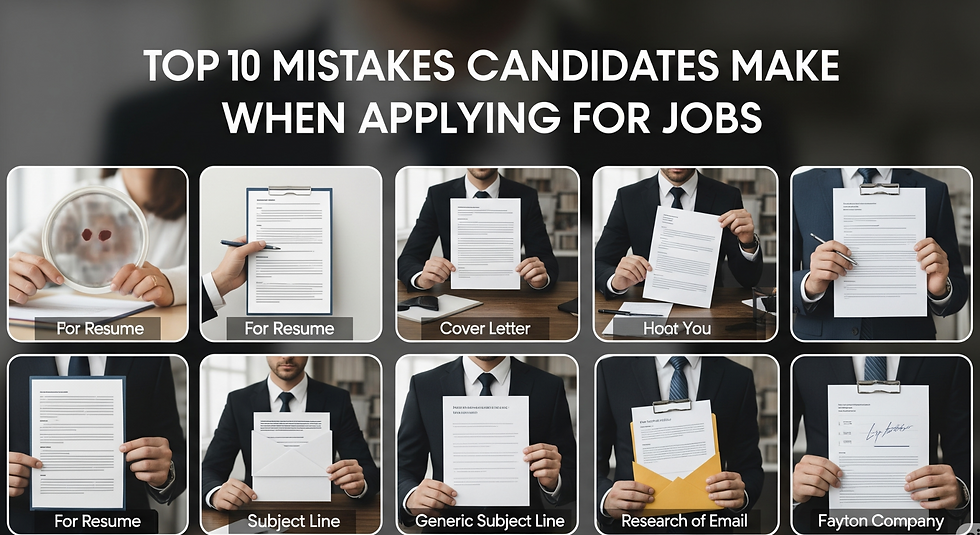10 Common Mistakes Candidates Make While Applying for Interviews (and How to Avoid Them)
- BTW Group
- Jul 29, 2025
- 3 min read

Table of Contents:
Introduction
Not Researching the Company Before Applying
Ignoring the Job Description
Applying Without Meeting the Basic Requirements
Overlooking Online Presence
Using Unprofessional Email IDs and Communication
Missing Application Deadlines
Failing to Prepare for Common Interview Questions
Not Following Application Instructions
Neglecting to Follow Up After Applying
FAQs
1. Submitting a Generic Resume and Applying for Interviews
One of the biggest mistakes candidates make is sending the same resume and cover letter to every job. Employers can easily spot a template application.
How to Avoid It: Customize your resume for each role. Highlight skills and experiences that match the job description, and personalize your cover letter to show genuine interest in the company.
Applying without knowing anything about the organization shows a lack of interest. Recruiters often ask, “What do you know about us?” — and generic answers won’t impress.
How to Avoid It: Spend at least 30 minutes researching the company’s website, social media, products, and values. Use this information to tailor your application and responses.
Many candidates apply blindly to roles without understanding the expectations. This leads to rejection or poor interview performance.
How to Avoid It: Read the job description thoroughly. Identify the key skills, responsibilities, and qualifications, then align your application accordingly.
While ambition is good, applying for roles you are completely unqualified for wastes both your time and the recruiter’s.
How to Avoid It: Apply strategically. If you lack a required skill, consider acquiring it through courses or certifications before applying.
Recruiters often check LinkedIn and other platforms. An outdated or unprofessional online presence can hurt your chances.
How to Avoid It: Update your LinkedIn profile with recent achievements, a professional photo, and relevant keywords. Clean up any unprofessional content from your social media accounts.
Using an email like coolguy123@gmail.com for professional applications creates a negative impression.
How to Avoid It: Use a simple, professional email format like firstname.lastname@gmail.com. In emails, maintain a polite and formal tone.
Many candidates wait too long to apply and miss opportunities. In competitive fields, this can cost you the job.
How to Avoid It: Set reminders for application deadlines and prioritize roles that align with your career goals.
Some candidates only focus on applying but neglect interview preparation. This leads to poor performance when they get called.
How to Avoid It: Practice answering common interview questions like:
“Tell me about yourself.”
“Why should we hire you?”
“What are your strengths and weaknesses?”
Rehearse your responses but keep them natural.
Overlooking instructions — like attaching specific documents or filling out forms correctly — leads to automatic rejection.
How to Avoid It: Read the job posting carefully and follow every instruction. Double-check before submitting your application.
Many candidates think their role ends after sending the application. But following up shows initiative and interest.
How to Avoid It: If you haven’t heard back in 1–2 weeks, send a polite follow-up email asking about the status of your application.
1. How many jobs should I apply for at once?
Focus on quality, not quantity. Apply for roles that align with your skills and career goals.
2. Should I apply even if I don’t meet all requirements?
If you meet 70–80% of the qualifications and can learn the rest, apply — but be honest in your application.
3. Is it okay to follow up multiple times?
Follow up once after 1–2 weeks. If there’s no response, move on without spamming the recruiter.




Comments